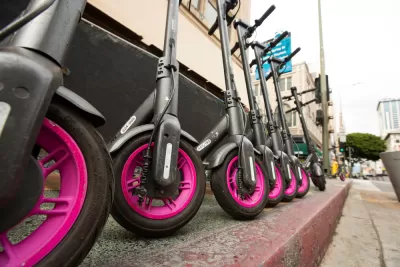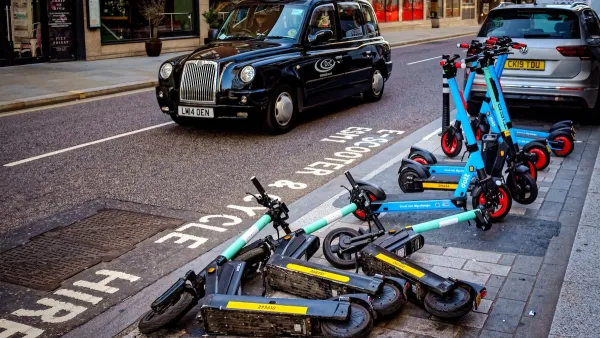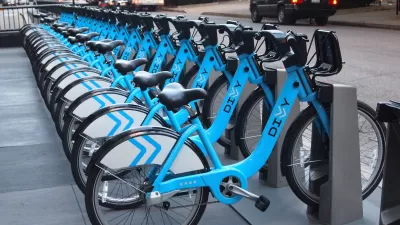After failing to deliver on promises of frictionless, free shared mobility, the operator will begin docking its scooters at stations to reduce sidewalk obstructions and eliminate the need to collect scooters for recharging.

After years of tension with cities, Lyft is planning to dock its fleet of electric scooters, which are frequently blamed for creating sidewalk clutter and obstructing walkways thanks to their ability to be parked anywhere. Sri Taylor and Sarah Holder report on the company’s plan for Bloomberg CityLab.
As Taylor and Holder explain, “The company oversees several municipal bikeshare programs, including New York City’s Citi Bike; according to Techcrunch, it has 100,000 bike docks that could be converted to the scooter-friendly option.” After the company launched a pilot docking program in Chicago last May, Lyft says the city’s shared mobility program, Divvy, saw increased ridership for both bikes and scooters. “It could also make rebalancing fleets easier for operators, help users predictably locate available wheels and facilitate coordination with public transit services.”
Free-floating scooters also must be recharged by taking them back to operations centers. “The company estimates that bringing in-dock power to 20% of a city’s station network can reduce drive-by battery swaps by 90%, and reduce the vehicle miles traveled to do it by 75%.”
Lyft plans to roll out a system of 1,000 next-gen docked scooters in Washington, D.C. this month.
FULL STORY: Lyft Has a Plan to Dock Its E-Scooter Fleet

Maui's Vacation Rental Debate Turns Ugly
Verbal attacks, misinformation campaigns and fistfights plague a high-stakes debate to convert thousands of vacation rentals into long-term housing.

Planetizen Federal Action Tracker
A weekly monitor of how Trump’s orders and actions are impacting planners and planning in America.

In Urban Planning, AI Prompting Could be the New Design Thinking
Creativity has long been key to great urban design. What if we see AI as our new creative partner?

King County Supportive Housing Program Offers Hope for Unhoused Residents
The county is taking a ‘Housing First’ approach that prioritizes getting people into housing, then offering wraparound supportive services.

Researchers Use AI to Get Clearer Picture of US Housing
Analysts are using artificial intelligence to supercharge their research by allowing them to comb through data faster. Though these AI tools can be error prone, they save time and housing researchers are optimistic about the future.

Making Shared Micromobility More Inclusive
Cities and shared mobility system operators can do more to include people with disabilities in planning and operations, per a new report.
Urban Design for Planners 1: Software Tools
This six-course series explores essential urban design concepts using open source software and equips planners with the tools they need to participate fully in the urban design process.
Planning for Universal Design
Learn the tools for implementing Universal Design in planning regulations.
planning NEXT
Appalachian Highlands Housing Partners
Mpact (founded as Rail~Volution)
City of Camden Redevelopment Agency
City of Astoria
City of Portland
City of Laramie





























